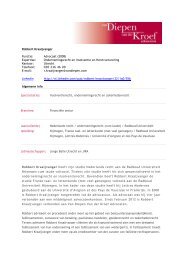© Van Diepen Van der Kroef Advocaten
© Van Diepen Van der Kroef Advocaten
© Van Diepen Van der Kroef Advocaten
- No tags were found...
You also want an ePaper? Increase the reach of your titles
YUMPU automatically turns print PDFs into web optimized ePapers that Google loves.
desirable that national courts do not accord immunity and proceed to settlement of thedispute at hand.’122. In the meantime, it is accepted in the most recent literature that the immunity ofinternational organisations, such as the UN, is no (longer) self-evident. The District Courtalso erroneously ignored this literature. The Association et al. refers to A. Reinisch, in R.Hofmann e.a., Die Rechtskontrolle von Organen <strong>der</strong> stateengemeinschaft, 2007, page 43).123. It is confirmed also in other literature that the Netherlands Court should check whetherupon establishing the functional immunity there would exist an alternative and effectivelegal remedy available to the litigant. If that is not the case, no immunity should beaccorded to the international organisation (see Kooijmans, op. cit., page 175). K. Wellenshas expressed the same view in publication, ‘Fragmentation of international law andestablishing an accountability regime for international organizations: The role of thejudiciary in closing the gap’ (see Michigan Journal of International Law, 11 May 2004).Wellens states, with reference also to Ch. Dominicé, that the right of access to the courtshould weigh more heavily than the interest of immunity (K. Wellens, op. cit., page 18):‘(…) access should prevail over immunity if no legal remedy is available.’Finally, the Association et al. refers to <strong>Van</strong> <strong>der</strong> Plas, op. cit., page 265:‘More to the point it follows from the caselaw of the ECHR that the right of access impedesany according of immunity where the plaintiff would otherwise have no effective legalremedy. The curtailment of Article 6 paragraph 1 ECHR would be disproportionate in such acase, alternatively would impugn the essence of the right of the plaintiff.’Ground of appeal 10124. The District Court erroneously consi<strong>der</strong>ed un<strong>der</strong> legal consi<strong>der</strong>ation 5.16 that:‘Now that the interpretation Article 105 of the UN Charter does not offer grounds forrestricting the immunity, the question arises whether other international-law norms –outside the UN frame of reference – prompt a different opinion. This enquiry into<strong>©</strong> <strong>Van</strong> <strong>Diepen</strong> <strong>Van</strong> <strong>der</strong> <strong>Kroef</strong> <strong>Advocaten</strong> page 54 of 99
















